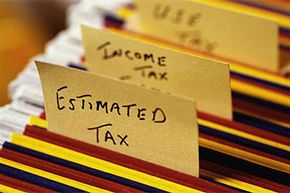Athletes, coaches and sports fans are fond of saying that ending a game in a tie is like kissing your sister. Apparently, they never had to pay estimated taxes. No one wins: not you, the person who has to fill out a form and pony up cash every three months, and not the paper pushers over at the Internal Revenue Service who should have something better to do than hound generally law-abiding citizens for their hard-earned money each quarter. So why do some folks have to suck it up and go through the quarterly ritual of guessing how much money they owe the tax man? Because they don't have someone else to do it for them.
The idea behind the tax system is to pay as you go. That's why most people who work have some money automatically taken out of their paychecks to cover what they're expected to owe in taxes at the end of the year. Some don't however, and others generate income from other sources that isn't immediately taxed.
Advertisement
A person who meets the following two conditions is generally required to pay estimated taxes throughout the course of the year [sources: Bell, Yale]:
- He is expected to owe at least $1,000 at the end of the year, after accounting for any withholdings and credits.
- He expects that those withholdings and credits will be less than 90 percent of what he owes at the end of the year.
It's up to the individual taxpayer to make this determination. The IRS won't tell you ahead of time that you're required to pay estimated taxes, but it will hit you with a penalty if you fail to do so, or if you don't pay enough. Those payments aren't deductible, even for business owners [sources: Bell, Yale].
Advertisement


